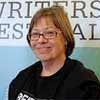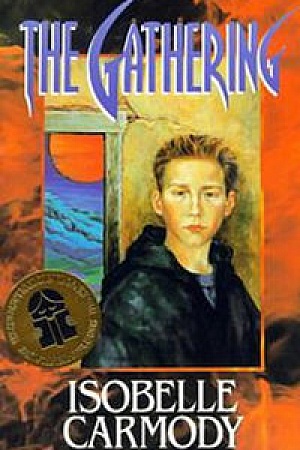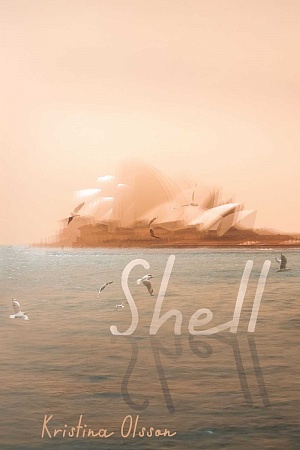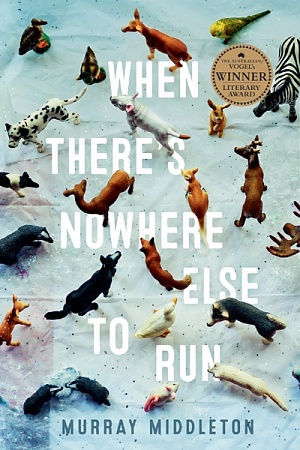An interview with Dorothy Hewett
When Dorothy Hewett won the Victorian Premier’s Literary Award for non-fiction with the first volume of her autobiography, Wild Card, it was a popular choice on the night. She’s a writer who has attracted all kinds of controversy, from libel suits to outrage over her flamboyant politics, both sexual and social. She has published four volumes of poetry, thirteen plays, but only one novel, called Bobbin Up, back in 1959. Jack Beazley, in a review for the Communist Review, criticised the novel for ‘an overstressing of physical relations’; a judgment that evidently didn’t deflect Dorothy Hewett from her interests, since physical relations, and the way that women feel about them, are still stressed in The Toucher. Setting herself a difficult task, Hewett has placed her central character, a woman writer, in a wheelchair, and without the company of a male lover, in order to talk about some of the things that preoccupy her now: old age, loneliness, physicality, relationships, personal history. She’s a generous talker, open and friendly, willing to think about any topic that is presented, and obviously very pleased to have produced another novel after years of believing that she couldn’t write one. I began by asking Dorothy Hewett how she felt about returning to the novel after so many years writing poetry and plays.
DH: It’s a very strange feeling I must admit. It was kind of helped along by the fact that I wrote that autobiography. That’s when I started getting interested again in writing prose, and realised that perhaps I could still do it. But it is an odd sort of feeling, and I’ve now started another novel, and the second volume of my autobiography has been put on hold while I write it. I’ve become totally fascinated by it. I always wanted to write novels. After I wrote Bobbin Up I started a couple more but they never seemed to get anywhere.
And then I started to get interested in the theatre and I thought, well, if I’m going to learn anything about this, it’s obviously going to be extremely difficult, and I wanted to concentrate on it. I didn’t want to be one of those Jill of All Trades people. And I made this quite conscious decision that I would only write plays and poetry. I think I was wrong now. I don’t know why I did it. It was something about feeling that perhaps I’d fragment everything and everything would turn out a mess. And I think a lot of women (perhaps not so much now) find the whole exercise of writing a novel rather daunting. When you can see the end of a project you can handle that, and you can write poetry in and out of other things in your life. All those years I was working, and of course having children, and it did mean that the amount of time I could actually devote to a project was very limited.
And the idea of sitting down and writing a novel just terrified me. I thought, when would I ever have the time to do it? Apart from the fact that I really did believe that I didn’t have the sort of mind that could get itself around a novel. I didn’t think I was organised enough, couldn’t keep all the bits together. Maybe I got so old that finally all the bits came together.
RS: And, indeed, the book’s about old age. But let’s start with a connected theme, and one that will probably be mostly talked about, female sexuality. It’s obviously – and mercifully becoming less terrifying, but are you apprehensive about the way the book might be received because of your treatment of female sexuality?
DH: A bit. I think if you write anything that deals with a subject that is controversial, you’re a bit nervous about the way it’s going to be received. My son, Tom Flood, says the book’s wishful thinking. I’m sure that’s what a lot of people will say because they don’t believe older women are capable of desire. I always find it so astonishing because really it's men who find it so hard to get it up in old age. Women don't have to do this.
RS: Quite clearly in the book you’re saying that Esther, even though she has to confront her crippled body, is just as lusty as she’s been all her life.
DH: Exactly. Nobody tells you – when you read articles about old age as you tend to do when you get older, they always used to present it that you would come into this beautiful calm. I read that book of Germaine Greer’s, The Change, and I enjoyed it, but one of the things I found most irritating was this idea that you stood out in the garden and everything was happy from then on and you didn’t have to worry about anything. I think that’s such bullshit.
RS: She also made the point that desires do retreat.
DH: Yes, and I don’t think this is so at all ... it certainly isn’t my experience, or, I think, of older women that I’ve spoken to.
RS: I admired the way you anticipated the scrutiny that you, as a well-known feminist, will be likely to undergo. Nevertheless, Iris must have been incredibly difficult to write.
DH: Yes, well I remember Hilary McPhee when she read the first chapters, when she was with McPhee Gribble, she was the one who first encouraged me to write the book – she said to me that Iris is the most unpleasant female character I’ve ever read. I think I got more sympathetic with her as time went on. She started off as a real little bitch, then as the story developed, I too began to see that she had a certain amount of right on her side, that she was having a pretty raw deal really. Then, I think when you become more sympathetic towards the character, the way you write the character begins to change, and this is good because who wants to write totally black or white characters?
RS: Perhaps if Iris had grown old, she might have, like Esther, looked back and realised that she was always attracted to men who would give her a raw deal. I wonder if Esther, given who she is, could have done it differently?
DH: I suppose if you believe in free will, everyone could behave differently if they put their mind to it. But I do believe that there is a certain programming in human nature, and that various people seem to be fated to behave in certain ways, so that even though I believe in free will, I believe that our natures push us in certain directions, and it’s very difficult to escape and to get enough insight to escape. The insight comes too late, when the escape mechanism is either no longer needed or doesn’t work anymore.
RS: Does that insight come to Esther?
DH: Well I hope that in that last scene, when she is sitting in the garden, that she did come, not to any blinding moment of realisation or anything ‘corny’ like that, but I hope that there was a suggestion that she did have an understanding of where her life had taken her, and a sort of acceptance of it. That’s why I did that last scene, which some people seem to find rather odd, because I finish the book not with her at all, but with old Maxie Crow going out on his last journey, because in a way he’s taking for her the journey towards death that she doesn’t take. The most unromantic figure in the book takes the journey for her that she thought she could take but couldn’t.
RS: Maxie is unromantic, but at the beginning of the story he was a bit different, there was a spark of something. Or was it just Esther’s view of him?
DH: No, there are certain people in your life that you’re drawn to. It’s usually for some subtle reason. Often they’re the most extraordinary sort of people and you wouldn’t think you would be drawn to them, but some sort of relationship is set up between people. This has always fascinated me, the way quite opposite people seem drawn to each other, and no one can explain why, let alone the people it’s happening to.
RS: Is it always negative, always destructive, when there is that inexplicable drawing together?
DH: I don’t think it always is, but I think most human relationships have a strong element of destructiveness in them. I think it is very hard to maintain human relationships. Incredibly difficult. I’m afraid I’m a bit of a cynic, although a romantic at the same time. They say there’s nothing more cynical than a failed romantic.
RS: From that point we’re going to have to get to the rather tedious subject of autobiography, because Esther is a failed romantic too.
DH: That’s right.
RS: You refuse the neat autobiographical tag at the end, having Esther in the book refuse it for her own writing. How do you work between the facts of your life and what you want to write as fiction?
DH: Of course, I’ve become terribly aware of it because I’m always being accused of it, and I’m always being accused of it in that sort of tone that says, well of course you have no imagination, therefore you have to write about what happened to you, and it’s just as well you had such an interesting life. Which I must say nearly drives me up the wall. So I am very aware of it. And I didn’t want to write, with Esther, a character that was exactly like me, but I wanted to create someone that I could feel empathy with, since the whole book is virtually told through her. If one’s going to put the whole weight of the book on one character, you have to be able to understand and imaginatively empathise with that person. It was quite a difficult problem, I hope I solved it, but I’m still not sure.
RS: There are episodes and bits and pieces in the book that Dorothy Hewett-watchers will delight in finding – for example the painter who wins the Archibald prize with a portrait of Esther.
DH: Oh yes. My publisher actually rang me up to ask me had I had an affair with Geoffrey Proud. I hadn’t. Ever. I think she thought he’d get upset and want to sue me.
RS: This being part of your history!
DH: But really, I couldn’t resist it, in a way. It’s an in-joke. I suppose I’m having a bit of fun with all those autobiography watchers. And the other part I had a lot of fun with was the ghost letters, and the reaction of the editors. That was all a lot of fun to write.
RS: Tell us about this part of the world, this south coast town of Western Australia, which is so important in the novel. It’s both mythical and real, isn’t it?
DH: Yes it is. Landscape in anything is always terribly important to me. I have to get the place right, otherwise the people can’t emerge. And I’d always wanted to write something, and it was probably going to be a novel, about the south coast of Western Australia, which has always had an enormous amount of imaginative melancholy fascination for me. For a start, it’s full of history. It has a long quite turbulent history, maritime history mostly.
And the place itself is full of great stormy seas and granite islands, and a sort of darkness linked with light that is utterly fascinating. I can’t understand why it hasn’t been written about more. When Tim Winton wrote Shallows, I was fascinated by it because it’s very much the same area I’m writing about. Tim lived there as a young man, and I used to go with my parents for years, from the time I was about five to my early twenties, to holiday there every year, in a little house facing the sea. Nothing like the house Esther’s got, it was a little weatherboard thing. And so I got to know that area very well, and I always wanted to write about it and I have written quite a lot of poetry about it.
Then, when I was there – occasionally I still go back to Western Australia and my sister owns the same house – I suppose it was four or five years ago, I was reading the local paper and there was this story in it, just a little news item, about this couple of drifters who came into town, a youngish man and woman. She disappeared, and then later he did; no one took much notice. Then the council was digging up the backyard of the house they rented and they found the girl’s body. Now, from that unlikely beginning came the idea of the story, and it turned out to be quite different, except for the body in the backyard. I always thought that part of the south coast would be the ideal setting for a murder mystery. As I don’t think I’d be capable of writing a murder mystery, this other idea came together in my head.
I actually started writing the book when I was in England. This sometimes happens, you start writing when you’re far away from the place you’re writing about, and things come together. I was in a pink house in the middle of a field and it was snowing. There was no television (which is always my downfall) and I just started writing.
RS: When did you decide that the young man, Billy, would have the capacity to love Esther in the way he does?
DH: Right from the beginning, I saw this woman sitting in the garden. That was the image that kept coming. I knew that she was crippled. I began to think at first that this couple would move into the house, and I thought that perhaps he might murder Esther. But as I thought about it, he changed, he became much more complex, and he grew out of the landscape. In other words he wasn’t someone who came into the place, he was someone who had lived there all his life, and in a funny sort of way, he became the spirit of the place. And that was how, quite late in the piece, I thought up the part about Maxie Crow, and the imagery of the feather.
RS: And that enables you to bring in the idea of bad blood, a family of outcasts, the family that is always to be found in country towns.
DH: In the country town where I was brought up, there were about three families that were considered beyond the pale. And I was always fascinated by these families. When we went to town once a week, I used to stand where they would congregate and watch them, because they always seemed so much more interesting. And the stories about them were always highly coloured – and possibly apocryphal. Their lives seemed so much more dramatic than anything that was around in the more conservative areas of town.
RS: Getting back to one of the central ideas: there’s no way Esther is going to go gently into that good night, and poor old Matt is swept off rocks to his particular death ...
DH: I’m very interested in writing about women who are left alone for whatever reason. How do they put their lives together, what happens? And to do that, if you’ve got women of that particular age, which I feel peculiarly able to write about because of my own age, they’ve either got to be divorced or widowed. That’s the reason poor old Matt gets the chop.
RS: Esther is gutsy, and her friend Emily, who comes to visit, is calm, but is there nothing to commend old age?
DH: I think all you can do is hang in there. And in a sense refuse to be old. Whether we like to believe it or not, old age is fraught, for many people, with the most terrible physical problems, and it’s often a prelude to loneliness, to being left in a fairly empty universe as your friends and relatives die off. It isn’t a time of calm and peace and loveliness at all, it’s a time when any sort of reserves of strength and character you’ve got are called on to start working. If you haven’t got them, or if you falter, it can be a time of great sadness, I think.











Leave a comment
If you are an ABR subscriber, you will need to sign in to post a comment.
If you have forgotten your sign in details, or if you receive an error message when trying to submit your comment, please email your comment (and the name of the article to which it relates) to ABR Comments. We will review your comment and, subject to approval, we will post it under your name.
Please note that all comments must be approved by ABR and comply with our Terms & Conditions.